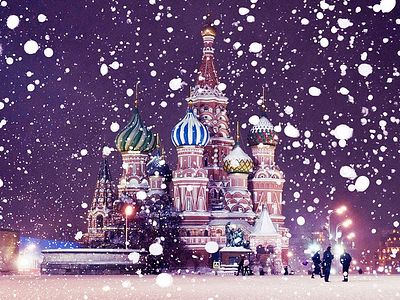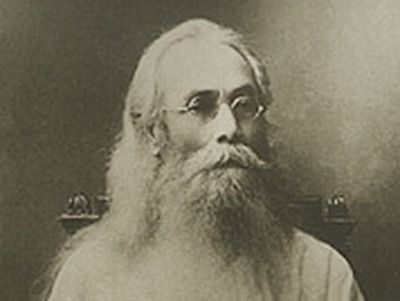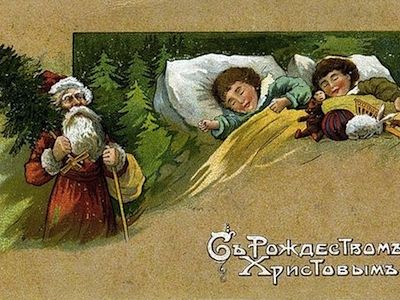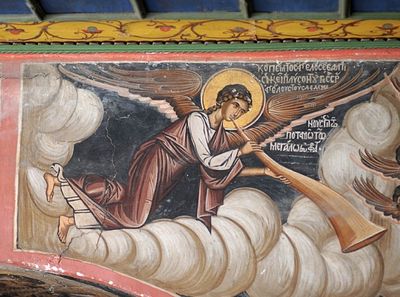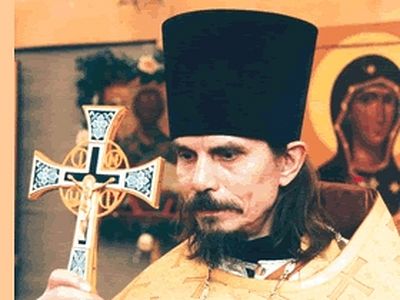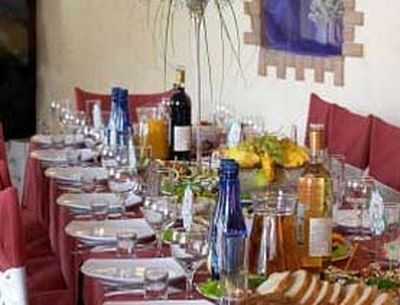The New Year is upon us, with all its celebrations. Those who observe the Julian calendar Christmas can find themselves in a quandary when they want to have a festive New Year without breaking the Nativity fast. A teacher at the Nichola-Ugresh theological seminary [just outside of Moscow], Lydia Konstantinovna Pavlova, shares her thoughts with Pravoslavie.ru.
 New Year's Eve on Red Square.
New Year's Eve on Red Square.
—Lydia Konstantinovna, the New Year is here, and soon will come the Nativity of Christ. Christ is born in the flesh, and it is from His birth that we reckon the New Year. Just the same, in Russia we first celebrate the New Year, and then, in a week, the Nativity of Christ. How can we greet these festive days with dignity, as an Orthodox Christian should?
—Our inner state should be love and gratefulness. We should be thankful to the Lord that we have lived through yet another year; thank God with hope that the next year would bring us joy, hope, and love.
The rift in the calendar should not trouble us. The Gregorian calendar appeared as late as the sixteenth century—two thousand years after the Julian calendar! And Russia has always lived according to the Julian calendar. Only after “Lenin and company” took over in Russia did the country change to the Gregorian calendar.
In those years, some voices in the Church were saying, “Perhaps we should also go to the new style calendar, like the Catholics?” But the Church retained the Julian calendar; after all, this is the calendar used to reckon the day of the Pascha of Christ.
So, it was the introduction by the Bolsheviks in 1918 of the Gregorian calendar that created the situation we have now of the secular New Year being celebrated earlier than the Nativity of Christ. It is a strange picture, especially in recent years, when the days between New Year and Christmas have become official holidays. And people really do get tired of these “holidays”. Although it would seem that it should be the other way around!
—And what do you think—why did the calendar change turn out to be one of the Bolsheviks’ first renovations? Could the workers have been so preoccupied with this issue?
 Lydia Konstantinovna Pavlova.
Lydia Konstantinovna Pavlova.
—And probably we should be thinking about the fact that the New Year is a new year beginning from the Nativity of Christ. Otherwise, isn’t it a senseless holiday?
—Yes, of course. After all, that’s the upstart of it—these holidays are senseless. The New Year senselessly “wins” in our lives, mixing everything up in it! But the people who produced this “catastrophe of civilization” in 1918 had thought all this through! They were educated people. These calendar changes led to them stealing Christmas from Russia. You now ask me: But how should the Orthodox conduct themselves? Nearly 100 years have passed, but this question still troubles us no less today. What should the Orthodox do?
You know, in our Nikola-Ugresh monastery we serve a New Year Liturgy, while all around the monastery a veritable black sabbath goes on: the explosion of firecrackers, the noise on the streets, the riot and chaos of sound, drunken shouts and cursing… But one wise priest has said, “Those people who are popping firecrackers and partying also thirst for happiness, after all!” But what is happiness? “Happiness” in Russian is “schastye”, the etymology of which is the “chast”, the “part” or “lot” given by the Lord. [This is actually similar to the etymology of “happiness”. “Hap” is also an old English word from the Nordic “luck”, “fate”, or “lot” given by providence.—Trans.] But our compatriots for the most part do not know that the Christmas star, which these fireworks actually symbolize, has not yet been lit! We just need to be patient for one more week! But please—no sooner! And we don’t need to put up a Christmas tree any sooner. We have forgotten that the evergreen tree is the symbol of eternal life in Christ; it is the symbol that there is no death!
In old Rus the evergreen tree was always set up only on Christmas Eve. Please, don’t set it up earlier! You see, the main problem of our lives today is that we are always in a hurry… We run down the streets, are late for everything; we are racing through life, and life is passing us by…
—We are trying to get a jump on events…
—Yes. This pace of life today is spreading to everything, even to the tomatoes. They try to grow them in one night! The chickens are laying eggs artificially: they trick them into thinking it is day instead of night. We are surrounded on all sides by surrogates: surrogate vegetables, surrogate foods, surrogates of our daily existence, surrogate relationships and surrogate holidays. But maybe we should “slow down” a little, even though the New Year has entered heavily into our modern culture? For us, all these new year days are a mystery—the deep white snow outside the window, the cozy warm hearth, the quiet family evenings, the delightful presentiment of Christmas! And even the pre-New Year mood that reigns in the streets today is after all, if you think about it, also a Christmas mood! Only people have forgotten about when and how it should be celebrated! This is also in its turn the result of a carefully thought out political technology meant to last for ages.
And it is very good that our President has spoken in his latest speeches of a “return to our traditions”, and reminded us that “We are not the same as everyone else.” We are something in particular, not resembling anyone else! Europe celebrates its Christmas according to the Gregorian calendar (December 25)—that is Europe. But we are Russia, and we celebrate Christmas on January 7. New Year ’s Day is secondary in Europe, and that is how it was for us once. So let’s remember that!
Of course, Orthodox people should be the first to remember this. And they should find the proper way to greet the New Year as it corresponds to the calendar by which our Church lives. We should all respect this Church tradition!
Of course, there is no reason for us not to greet this New Year night at a festive table, but this table must be Lenten. If friends and relatives come to see us, then we will joyfully spend time with them on this New Year’s night. And this is beautiful, because we so rarely spend time with one another, so rarely see each other, we have drifted so far from each other—children and parents, relatives and close friends. To be quite honest, today “friendship” has turned into something more like “collaboration”. Therefore any excuse for gathering together around a single table to talk, to warm our hearts from each other, is always good.
—Lydia Konstantinovna, during soviet times, when the Church was persecuted and looked upon as a kind of ghetto (although we didn’t fully understand it at the time), there wasn’t such a strict opposition between the civil celebration of New Year and the Church tradition. I remember how after a New Year moleben in the Academy church of the Moscow Theological Academy the seminarians stocked up on tins from the store—that night, as I recall, fish was allowed (as a condescension to human weakness), but everything was somehow quite humble. Even the scope of the government’s celebration was modest. Just compare the old “blue lights” of soviet times with today’s bacchanalia that fills literally every TV channel. Moreover, today’s society is trying in every way to anticipate the holidays and stretch them out! For example, the Christmas lights and trees appear on the streets practically in October. To what does this testify? Maybe we have lost our minds?
—Yes, we have slightly lost our minds! And not only have we, but so has the entire world. Today the whole world is living through an era of neo-paganism: worship of the body, worship of pleasure. Today people are only demanding “food and shows”, so that in that sense we have fully returned to ancient Rome. But if we remember soviet times—in those days we only had two real holidays: Victory day and New Year. We waited all year for this holiday, the New Year, and it was a good, joyful day, free of all ideological strings.
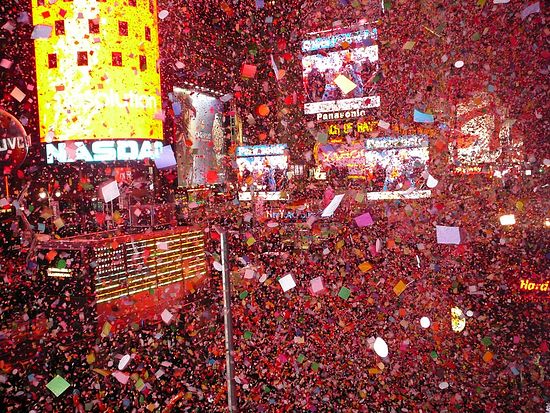 New Year's Eve on Times Square, New York.
New Year's Eve on Times Square, New York.
But today it has turned into something purely pagan—not even a holiday, but some sort of bonfire of consumption. Without a doubt, the consequences of this bonfire will be emotional and spiritual emptiness. And people “burn out” to such a degree that they completely forget that our “winter Pascha” is on January 7… Many of us “shuffle” up to this date almost completely exhausted, both physically and morally. It is obvious what everyone feels and senses!
And the Lord sees it all! But you know, in my opinion it is even good that this is what is happening today. Because every Orthodox person is a warrior, and today each of us will be tested. The test of New Year! Will you stand up to it, or not? Will you pass the test? And if you pass it, as St. Paisios the Athonite said, “The Lord is not cruel, and after every trial there will always be consolation.” Therefore, if you withstand the trial of this consumerist, neo-pagan “holiday,” then you will worthily greet the Nativity. And the Nativity will greet you! This is a miracle, simply a miracle! This is a test of your metal.
You mustn’t be afraid of the New Year; you need to approach it like a warrior. We recall the Generalissimos Suvorov: “A war is lost when the warrior perceives that he has lost.” You need to approach the New Year knowing that you will not lose.
I personally have found a way out of this situation. Not only in our monastery, but also in other monasteries and churches a New Year Liturgy is served, and by attending them we are as if “hiding” from the world. The church acts in this case like a ship that carries us away from the bacchanalia of consumerism and various baser pleasures. After all, if we take a look at it, today we are surrounded by the world—what is spewing out on us from the TV screen, what goes on in the streets, it’s just monstrous… Sometimes it seems to me that it is not even festivity, but madness! Of course, we have lost the culture of festivity, but there still are existing springs of purity… We must choose the pure springs; let there be chaos around us, but there are springs! We have to remember this always, because the meaning of our existence today is not to look for the negative, but only for the positive! We must thank God that we have lived through another year.
—Yes, after all, every year we have lived is a kind of sum or conclusion, and we must, we are obligated to think about what the former year signified to us. Not to make a balance sheet, but to simply think about it, and first of all, about ourselves… How can we gather our thoughts in the midst of this bonfire of a pseudo-holiday?
—Father Paisios had a remarkable expression that, “today we are controlled by machines, and our hearts are becoming like iron.” But God is stronger than all machines, goodness is always stronger than evil, and the Protection of the Most Pure Mother of God is over us. But we also must not be careless; we must understand what is what. Each of us can find some number of close friends, and each of us can find some opportunity and time to spend with them. Even if your neighbor is not of your nationality, not like you, you should nevertheless be of one soul with him. This is our greatest wealth.

